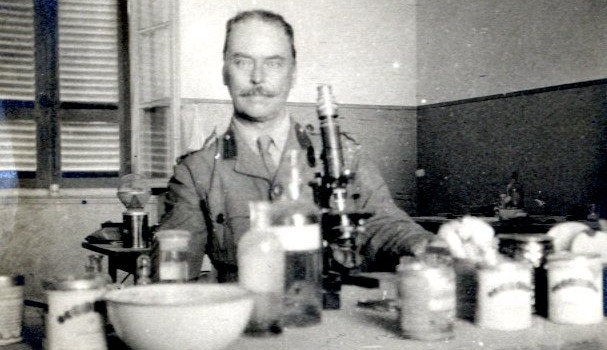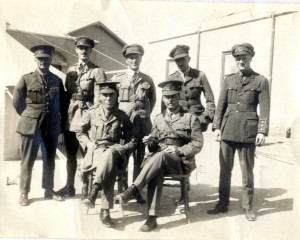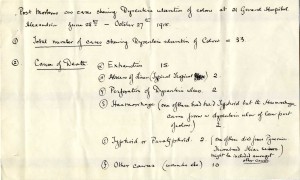In July 1915, Sir Ronald Ross was appointed Consulting Physician on Tropical Diseases and was sent to Alexandria in Egypt for four months to research disease among the troops in the Dardanelles. In his report at the end of his service, he states that on visiting seven large hospitals in Alexandria, nearly all medical cases belonged to five groups of diseases usually prevalent in British troops in warm countries: typhoid, jaundice, malaria, dysentery and mixed cases. Of these, dysentery (an infection of the intestines that causes diarrhoea containing blood and mucus) was the principal cause of sickness in the Mediterranean Expeditionary Forces. Figures from a report show that from 29 August to 9th October 1915 there were 32,528 cases of diarrhoea and dysentery with 231 deaths.
He found that many of the cases were amoebic dysentery which meant prolonged illness and cases of liver abscesses. Ross instructed that all patients showing dysenteric symptoms at the front be given emetine and this resulted in patients reaching Alexandria in a less critical condition. He also worked with his assistant, David Thomson on the survival capacities of intestinal amoebae in sun exposed sand.
When the outbreak of dysentery ceased, Ross made a short visit to Salonika to inspect anti malaria work and then returned to England, arriving on 30 November 1915.
In the Archives there is a large collection of material on Ross’ work in Alexandria including photographs of the 21 General Hospital in Alexandria where Ross worked, garrison orders warning troops not to clean cutlery with unsterilized sand, nominal roll of admissions for dysentery for Number 17 General Hospital, post mortems on cases showing dysenteric ulceration of colon at 21 General Hospital by George Bertram Bartlett and charts showing incidence of bowel complaints in the Mediterranean Expeditionary Force by David Thomson.
For further information, please contact the Archives Service at archives@lshtm.ac.uk









